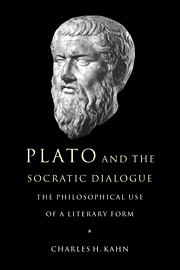Book contents
- Frontmatter
- Contents
- Preface
- List of abbreviations
- 1 Sōkratikoi logoi: the literary and intellectual background of Plato's work
- 2 The interpretation of Plato
- 3 Socrates
- 4 Plato as a minor Socratic: Ion and Hippias Minor
- 5 Gorgias: Plato's manifesto for philosophy
- 6 The priority of definition: from Laches to Meno
- 7 Charmides and the search for beneficial knowledge
- 8 Protagoras: virtue as knowledge
- 9 The object of love
- 10 The emergence of dialectic
- 11 The presentation of the Forms
- 12 Phaedrus and the limits of writing
- Appendix On Xenophon's use of Platonic texts
- Bibliography
- Indexes
8 - Protagoras: virtue as knowledge
Published online by Cambridge University Press: 02 November 2009
- Frontmatter
- Contents
- Preface
- List of abbreviations
- 1 Sōkratikoi logoi: the literary and intellectual background of Plato's work
- 2 The interpretation of Plato
- 3 Socrates
- 4 Plato as a minor Socratic: Ion and Hippias Minor
- 5 Gorgias: Plato's manifesto for philosophy
- 6 The priority of definition: from Laches to Meno
- 7 Charmides and the search for beneficial knowledge
- 8 Protagoras: virtue as knowledge
- 9 The object of love
- 10 The emergence of dialectic
- 11 The presentation of the Forms
- 12 Phaedrus and the limits of writing
- Appendix On Xenophon's use of Platonic texts
- Bibliography
- Indexes
Summary
THE PLAGE OF THE PROTAGORAS AMONG THE DIALOGUES
Among the seven works grouped together here as threshold dialogues, the Protagoras is clearly the literary masterpiece. It is the longest of the seven, roughly the same length as the Symposium and Phaedo. As an exemplar of Plato's dramatic art the Protagoras is rivaled only by the Symposium in the number and eminence of the speakers, the vividness of the dialogue, and the diversity of the action. Plato has taken pains to create here a brilliant picture of Athenian culture in the last years of the Periclean age, a half dozen years before his own birth, as backdrop for a full-scale treatment of the question raised by Socrates in the Laches: what is the proper goal of moral education, and how can this goal be achieved?
But if the Protagoras is one of the most brilliant of Plato's dialogues, it is also one of the most perplexing. There is, first of all, the question why Socrates' offers such an elaborate misinterpretation of Simonides' poem. This episode has often been an embarrassment to admirers of Socrates, since he seems here to be playing the part of the sophist rather than that of the philosopher. There is the much-discussed problem of Socrates' identification of pleasure and the good in the final argument, which is unlike what we find in any other dialogue. And there is also the strange denial of akrasia in the same argument: the denial of what we call weakness of will or yielding to temptation, acting against one's better judgment.
- Type
- Chapter
- Information
- Plato and the Socratic DialogueThe Philosophical Use of a Literary Form, pp. 210 - 257Publisher: Cambridge University PressPrint publication year: 1997



